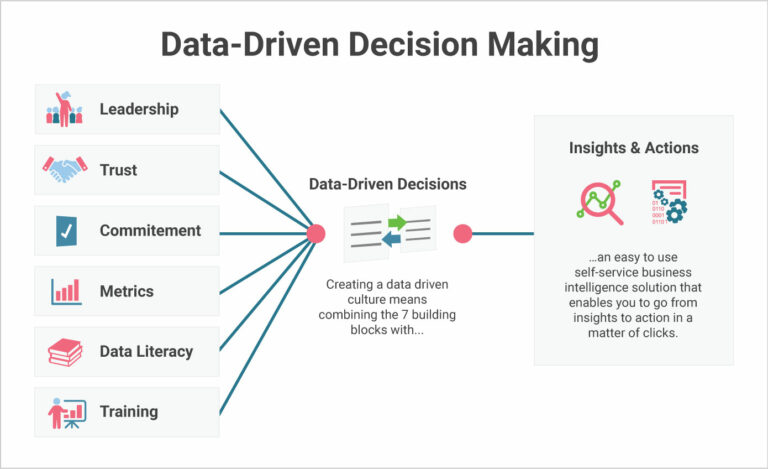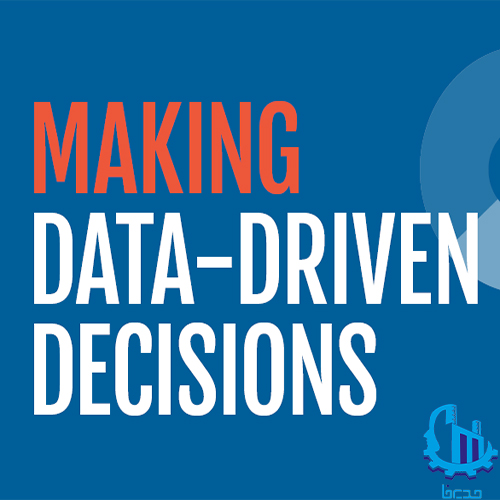What is data-driven decision making?
Data-driven decision making is the process of using data points and metrics to guide your strategic business decisions. It means that you eliminate the main decisions and leave the decisions based on the experience and knowledge of people and start making choices that are in harmony with the goals of your company.
Business intelligence tools enable data-driven decision making by keeping data accessible to everyone in your organization.

The importance of data-driven decision making
Data and analytics are changing the basis of competition. Leading companies use their capabilities not only to improve their core operations but also to launch entirely new business models. The role of data and analytics is increasingly no longer an independent discipline, but rather as a catalyst for digital strategy or transformation.
By 2023, data literacy will become an essential driver of business value, as evidenced by its formal incorporation into more than 80 percent of data and analytics strategies and change management programs.
For years, analysts have predicted that data analytics will become critical to business success, and data and analytics capabilities have advanced in recent years with new automated tools, easier integration of data sources, real-time reporting, interactive data visualization, and more. They have taken a big leap forward
The benefits of data-driven decision making
Some of the benefits companies see when creating a data-driven culture include:
– Safe decisions: When you can better understand the impact of your decisions, you will make more confident decisions
– High activity: Data-driven insights can help you identify business opportunities and customer experiences, and proactively identify your product weaknesses before they become serious problems.
– Achieving success and longer life: With a regular outlook on market changes or trends, organizations become more agile and can focus and maximize their resources for success.
– Awareness and transparency: Keep everyone in your organization informed of company goals, customer satisfaction, and more.
– The answer to why: Gain deeper insights into your customer experiences, identify weaknesses and strengths to attract customers.
– Identification of new income growth: The company’s view of market trends can help discover new income streams.
However, these benefits are not just about a business intelligence tool, to achieve these benefits you need to create a data-driven culture.

With the passage of time, the developments are more significant than before, the basis of the developments are all based on the needs that the owners of different businesses and industries achieve by analyzing their data. In the growth of the fourth industrial revolution and the fourth age of quality, which the world is in the middle of this path, data has become a fundamental element for the organization.
With the passage of time, the developments are more significant than before, the basis of the developments are all based on the needs that the owners of different businesses and industries achieve by analyzing their data. In the growth of the fourth industrial revolution and the fourth age of quality, which the world is in the middle of this path, data has become a fundamental element for the organization.
In the data-oriented management conference, we will learn about the following topics:
What is central data?
Why should the organization be data -driven?
What is the pivotal data in world and Iranian organizations?
How will the data -driven organized?
What infrastructure is needed for the organization’s central data?
What processes can be data -driven?
What are the results of data management based on data?
Click on the link below to register and see more details of the data -driven conference
How can you gain data -driven culture?
There are 6 key parts that you can follow when creating data -based culture:
leadership
If a data -based mentality is not accepted by the leadership of a company, it is unlikely to be institutionalized for the rest of the organization. Because data viewing involves significant changes in how each part of a business works. It may mean that employees do not accept managers’ decisions without data that supports their programs. In fact, managers devote time to themselves and their employees to learn new data skills.
the trust
Trust is another important principle in data -driven companies. All parts of a company, from workers to executives, must be sure that data is accurate and reliable.
obligation
Creating a data -based culture cannot be a completely regular process. It depends on the long -term commitment of all individuals in the organization. To ensure this long -term commitment of companies must:
Ensure that analysis is related to important business efforts.
Make data a priority for employees coaching.
To make sure the team’s goals are always there to measure team performance
Invest in artificial intelligence technologies so that data is always available.

Criteria
Given that we have focused on the importance of data and criteria so far, keep in mind that the criterion is not just important, but you need to know which data you are focusing on.
-Choose key performance key features to measure success -If you measure key performance indicators, you will never get the answers you need.
-Refer to previous data to set realistic goals.
-Construct the new technology required by the organization to access and analyze data
-Case the data of the data responsible for ensuring accurate data and proper access to the organization
Data literacy
Data adjustment means changing our performance in your daily activities. This means that people may not have the skills needed to guide the data.
Developing a data literacy plan across organizations means ensuring that employees understand what the data means and how they can read charts.
Education
Data can only be effective when they are in the decision -making process. The real purpose is to turn it into “practical insights”:
-What tools do you have now or you should get?
-Are the data easily available?
-Does the team understand the data visualization?
-I have to train your own organization or have to hire a new person
Find the key stakeholders in the business that have data -based views, teach them literacy and empower them to promote data -based culture in your organization.
The decisions we make every day for our products and services are endless! How can you make sure these decisions are data -based? Here are two examples:
1. Look for improved product experience? Take a look at your program data to see where people are in trouble.
2. Do you want to make a change to your website? It is better not to make changes just because you think they are a good idea. Implement A/B tests to give users a variety of experiences and see what version is best and make your decision!
Data -based decision -making examples
Managing consultants are ready to provide services and advice on data science in your organization.
021-88761795
021-88764867



No views